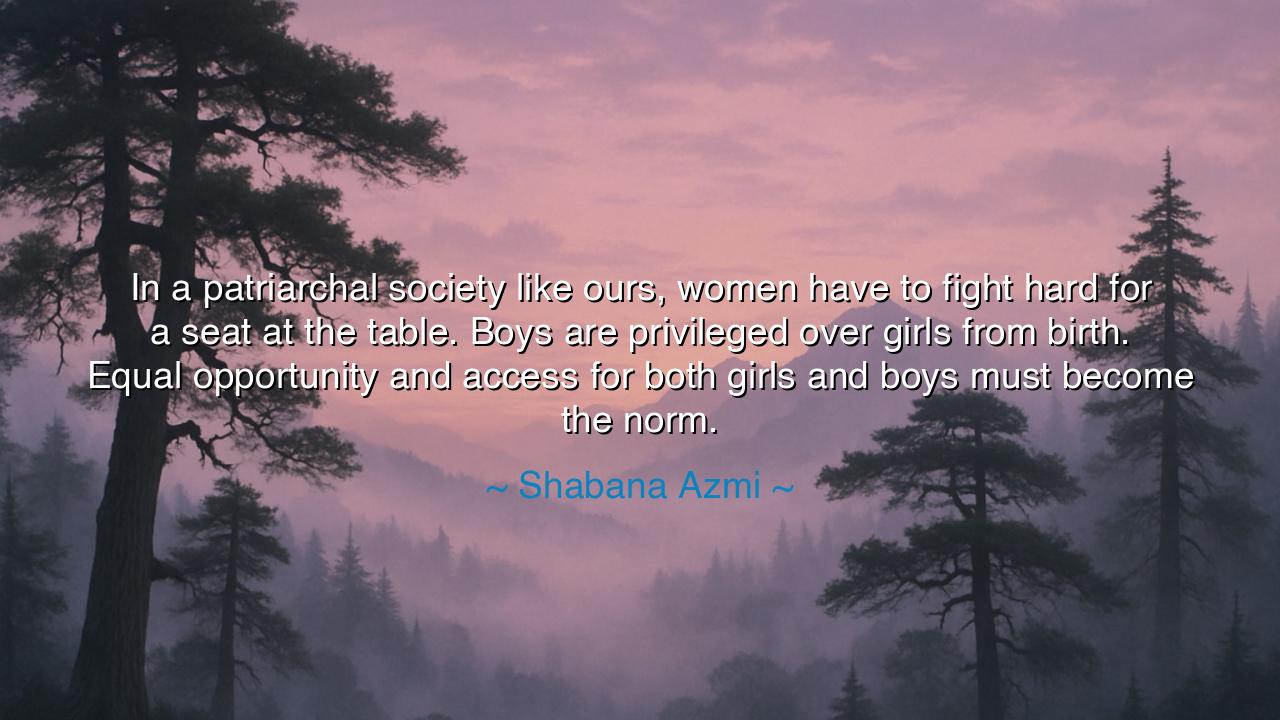
In a patriarchal society like ours, women have to fight hard for
In a patriarchal society like ours, women have to fight hard for a seat at the table. Boys are privileged over girls from birth. Equal opportunity and access for both girls and boys must become the norm.






Hear the steadfast words of Shabana Azmi, spoken with the fire of justice: “In a patriarchal society like ours, women have to fight hard for a seat at the table. Boys are privileged over girls from birth. Equal opportunity and access for both girls and boys must become the norm.” These are not words of idle reflection but of battle cry and vision. They lay bare the ancient imbalance, where power has been chained to the hands of men, while women, equally capable and equally gifted, have been denied their rightful share of life’s banquet.
The ancients too bore witness to this imbalance. In many lands, the birth of a boy was celebrated as fortune, while the birth of a girl was met with silence or sorrow. Yet history also tells of women who rose like flames against the darkness: queens, warriors, poets, and saints, whose brilliance defied the chains of custom. Their lives stand as monuments to the truth Azmi speaks—women do not lack strength; rather, society has too often denied them the stage upon which to reveal it.
Consider the story of Malala Yousafzai, the young girl from Pakistan who, despite threats and violence, demanded the right to education. In a world where boys were given classrooms and books, while girls were cast aside, she raised her voice against injustice. Though an assassin’s bullet sought to silence her, she survived and grew into a symbol of courage, reminding the world that equal opportunity is not a gift but a birthright. Her struggle is the living echo of Azmi’s call for justice.
Patriarchy, like an ancient tree, grows roots deep into culture and tradition. It whispers lies—that men are leaders and women followers, that boys inherit strength and girls submission. These lies have been repeated across centuries until they appear as truth. Yet, as Azmi declares, this order must be overturned. The norm must no longer be privilege for some and struggle for others, but a balance where both boys and girls drink equally from the well of opportunity.
The lesson for us is clear: no society can call itself free or prosperous if half its people must beg for their rightful place. A table that excludes women is not whole; a future that silences girls is not bright. If a society would endure, it must lift every voice, honor every mind, and welcome every hand into the labor of building its tomorrow. Equality is not a dream, but the foundation upon which justice and peace are built.
Therefore, O listener, take this charge upon your heart: honor the women in your home, your community, your nation. Refuse to repeat words or practices that diminish them. Demand schools where daughters learn beside sons, workplaces where women rise without barrier, and households where respect flows in equal measure. Teach your children that dignity knows no gender, and that strength is not bound to man or woman, but to the soul itself.
And so, let Azmi’s words be remembered as both challenge and promise: “In a patriarchal society like ours, women have to fight hard for a seat at the table… Equal opportunity and access for both girls and boys must become the norm.” Let these words be carved into our laws, lived in our homes, and spoken into the hearts of future generations. For only then will the table of humanity be whole, and only then will the feast of justice be shared by all.






AAdministratorAdministrator
Welcome, honored guests. Please leave a comment, we will respond soon